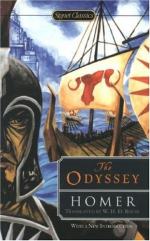But even Peisistratus has not been suffered to remain in possession of the credit, and we cannot help feeling the force of the following observations:—
“There are several incidental circumstances which, in our opinion, throw some suspicion over the whole history of the Peisistratid compilation, at least over the theory that the Iliad was cast into its present stately and harmonious form by the directions of the Athenian ruler. If the great poets, who flourished at the bright period of Grecian song, of which, alas! we have inherited little more than the fame, and the faint echo; if Stesichorus, Anacreon, and Simonides were employed in the noble task of compiling the Iliad and Odyssey, so much must have been done to arrange, to connect, to harmonize, that it is almost incredible that stronger marks of Athenian manufacture should not remain. Whatever occasional anomalies may be detected, anomalies which no doubt arise out of our own ignorance of the language of the Homeric age; however the irregular use of the digamma may have perplexed our Bentleys, to whom the name of Helen is said to have caused as much disquiet and distress as the fair one herself among the heroes of her age; however Mr. Knight may have failed in reducing the Homeric language to its primitive form; however, finally, the Attic dialect may not have assumed all its more marked and distinguishing characteristics:—still it is difficult to suppose that the language, particularly in the joinings and transitions, and connecting parts, should not more clearly betray the incongruity between the more ancient and modern forms of expression. It is not quite in character with such a period to imitate an antique style, in order to piece out an imperfect poem in the character of the original, as Sir Walter Scott has done in his continuation of Sir Tristram.
“If, however, not even such faint and indistinct traces of Athenian compilation are discoverable in the language of the poems, the total absence of Athenian national feeling is perhaps no less worthy of observation. In later, and it may fairly be suspected in earlier times, the Athenians were more than ordinarily jealous of the fame of their ancestors. But, amid all the traditions of the glories of early Greece embodied in the Iliad, the Athenians play a most subordinate and insignificant part. Even the few passages which relate to their ancestors, Mr. Knight suspects




